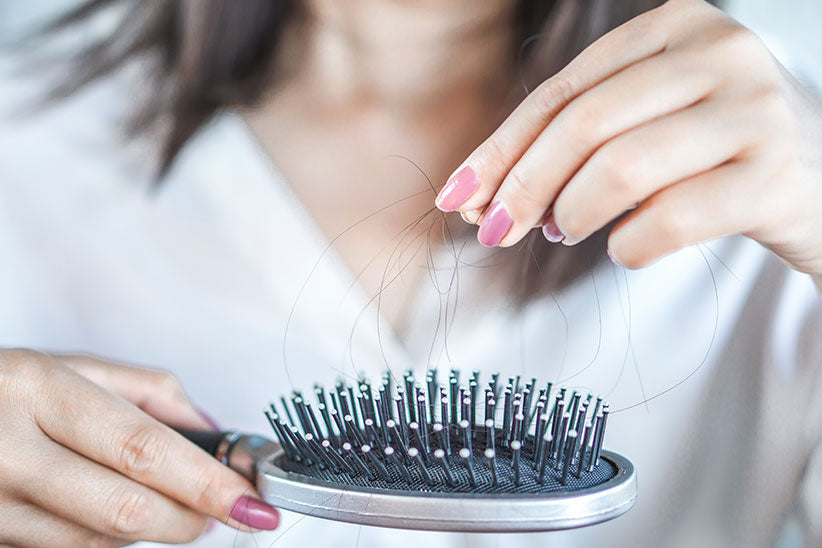
Weight Loss and Hair Loss – A Complicated Relationship
Hair loss is a very common topic in almost all weight loss forums. If you find a group of people talking about weight loss, you will almost always see someone talking about hair loss as well.
It is a complex subject, and in order to really understand it, you have to know the basics of how hair grows and falls out in general. There are four basic stages of hair growth and during some of this time, you naturally lose hair. This happens constantly, as your hair is constantly going through these phases.
THE FOUR BASIC STAGES OF HAIR GROWTH:
- Anagen Phase — 80-90% of your hair is in this stage for 2-7 years. During this time your hair is growing continuously.
- Catagen Phase — this is a transition phase which lasts about 10 days, during this time your hair follicles shrink, detaching from blood supply and your hair stops growing.
- Telogen Phase — this is a “resting” phase which lasts about 3 months. During this time 10-15% of the hair that has detached stays in place while new hair grows beneath it.
- Exogen Phase — this is also known as the shedding phase, during this time it is normal to lose 50-100 strands of hair a day.
Oftentimes during weight loss people will assume that it is the diet that they are on (or diet product) causing their hair loss when it is really just the normal hair growth/loss process, but because they are doing something different (ie: dieting) they are paying more attention.
However—and this is the important part—hair follicles are among the most metabolically active in your body. This means that your hair can be affected when you start to lose weight and/or your metabolism and hormones regulate. This doesn’t mean that you are malnourished (if you are following the GOLO way of eating, then you are getting plenty of nutrients), but you might be eating less than you were before. This also doesn’t mean that your hair loss will accelerate or you will lose all of your hair, but rather that your body is regulating.

Research shows that hair growth can be impacted when you reduce your caloric intake, so it is possible that you can start to lose hair if you have reduced the number of calories you used to eat. Therefore, depending on how much of a change the GOLO plan is to your previous diet, it could be possible that you might lose some hair. This is just a simple fact, but not to worry...keep reading.
It’s important to remember that GOLO is not a restrictive “fad diet” that eliminates food groups, so if you experience slight hair loss, it should be temporary. Additionally, if you are following the GOLO Plan, you are getting lots of nutrient-dense foods and proteins that contain vitamins that are essential for hair growth.
Keep it mind that, according to some experts, the more weight you lose, the more likely that you may experience some hair loss during your weight loss journey. If you have a history of yo-yo dieting, this can impact your metabolism which affects hair growth. Some people experience hair loss within 3-6 months of starting a new diet, however a balanced, healthy way of eating (like with GOLO) should reverse any loss you may experience within six months.
And here is even better news—according to Health Canada: GOLO’s dietary supplement (Release®) has ingredients that improve the strength of your hair! In fact, many of our customers report that their hair is stronger and healthier than it was before GOLO. So, if you are taking the Release® supplement—even if you start to lose some hair—it should come back healthier, stronger and shinier than it was before!
However, if you are not following the GOLO Plan and are instead following a restricted and/or fad diet that eliminates foods and food groups, or has you eating a very low amount of calories, your hair loss could be more extreme. This is why we suggest that you always follow the GOLO Plan.
HAIR LOSS PREVENTION TIPS:
- Make sure that you are eating plenty of protein and an adequate number of calories. A drastic reduction in either of these, can result in hair loss.
- Eat plenty of whole grains, vegetables, and fruits
- Get plenty of sleep

In the event you are experiencing hair loss, the information in this blog can be used to help you understand what might be happening, however, if you feel that your loss is out of the ordinary, it’s important that you work with your healthcare provider to determine the ultimate cause and develop a plan for regrowth.
Sources:
Information for this article was collected by the health and wellness experts at GOLO using the following sources:
National Library of Medicine
Visit GOLO.com to access all the weight loss tools GOLO has to offer!
1-800-730-GOLO(4656) support@golo.com
GOLO is not intended to diagnose, treat, prevent or cure any illness or disease. This blog provides general information and discussion about health and wellness related subjects. The words and other content provided in this blog, and in any linked materials, are not intended and should not be construed as medical advice. GOLO encourages you to consult a doctor before making any health changes, especially any changes related to a specific diagnosis or condition. All opinions and articles linked to and from this page are those of the individuals concerned and do not necessarily represent those of GOLO, LLC or its employees. No responsibility can be accepted for any action you take or refrain from taking as a result of viewing this page. GOLO will not be liable for any errors, losses, injuries, or damages from the display or use of this information. These terms and conditions are subject to change without notice.
Tagged with: